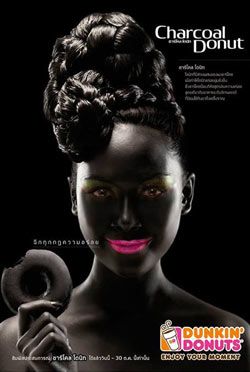Dunkin' Donuts
Dunkin' Donuts is an American multinational coffee and doughnut company founded by William Rosenberg in Quincy, Massachusetts, in 1950.The chain was procured by Baskin-Robbins' holding company Allied Domecq in 1990; its securing of the Mister Donut chain and the transformation of that chain to Dunkin' Donuts encouraged the brand's development in North America that year. Dunkin' and Baskin-Robbins ultimately became subsidiaries of Dunkin' Brands, settled in Canton, Massachusetts, in 2004, until being bought by Inspire Brands on December 15, 2020.[1]
Having around 12,900 locations in 42 countries, Dunkin' is one of the biggest coffee and donut shop chains in the world. Its products include donuts, bagels, coffee, and Munchkins donut holes.[2]
Blackface Thai Dunkin Donuts Ad
The advertisement is to promote a chocolate "Charcoal Donut" that shows a Thai lady with dark hair, blackface cosmetics, and bright pink lipstick. She is holding a black donut.
The ad opens with a fair-skinnned teenager wearing a white dress standing in a white room. A nearby shot of the young lady's face uncovers a blaze of insubordination in her dreary eyes before she nibbles into a chocolate donut. At that point the camera slices to a splash of chocolate, the young lady takes another nibble - and abruptly her white face turns black.
From that point onward, the camera pulls back to show the young lady painted in chocolate all over, including her hair, done up in a 1950's beehive. Her lips are bright pink. At last a slogan moves quickly over the screen: “Charcoal Donut: Break every rule of deliciousness."[3]
Controversy
A Dunkin' Donuts advertisement in Thailand that highlights a lady in blackface is causing worldwide debate. A few US media took on the story, pointing out to the similarity of the chocolate covered girl in the donut advertisement to blackface minstrel caricatures from America during the 1930s and '40s that once taunted black Americans in the United States. After the ad campaign started, Human Rights Watch Asia requested that Dunkin' Donuts eliminate the advertisement that running in Thailand and calling them "bizarre and racist."
"It's both bizarre and racist that Dunkin' Donuts thinks that it must color a woman's skin black and accentuate her lips with bright pink lipstick to sell a chocolate doughnut," Phil Robertson, the deputy Asia director for Human Rights Watch, told the Associated Press. "Dunkin' Donuts should immediately withdraw this ad, publicly apologize to those it's offended and ensure this never happens again."[4]
Some expert says that the message the ad conveyed, if it was proposed to be about black people in America or dark skinned people in Asia, mirrors a bias regularly used to discriminate.[5]
Clarification
The Thai franchise runs independently from the American operation. While Dunkin' Brands headquarters has apologized and referenced in a statement that they are working with their franchisee to promptly pull the TV spot and to change the campaign, the head of Dunkin' Donuts Thailand, Nadim Salhani, was unapologetic when reached reached about the advertisement.
Sahlani told Associated Press that she does not get the idea why the ad using black is not allowed. She wonders whether ads having white color or white products would have been accepted. Her own teenage daughter is the model in the controversial photo.[6]
References
- ↑ Dunkin' Donuts. Retrieved on December 26, 2020.
- ↑ About Dunkin' Brands. Retrieved on December 26, 2020.
- ↑ Bagenal, Flora (2013). Blackface Dunkin' Donuts ad in Thailand brings racism accusation. Retrieved on December 26, 2020.
- ↑ Taube, Aaron (2013). Human Rights Watch Says This Thai Dunkin Donuts Ad Is 'Bizarre And Racist'. Retrieved on December 26, 2020.
- ↑ Bagenal, Flora (2013). Blackface Dunkin' Donuts ad in Thailand brings racism accusation. Retrieved on December 26, 2020.
- ↑ Bain, Zoe (2013). Dunkin' Donuts Apologizes for Racist Advertisement. Retrieved on December 26, 2020.

